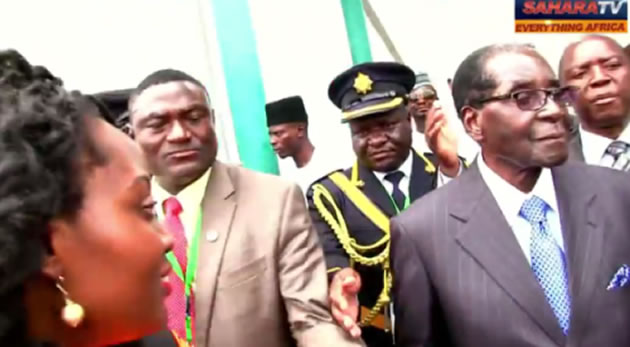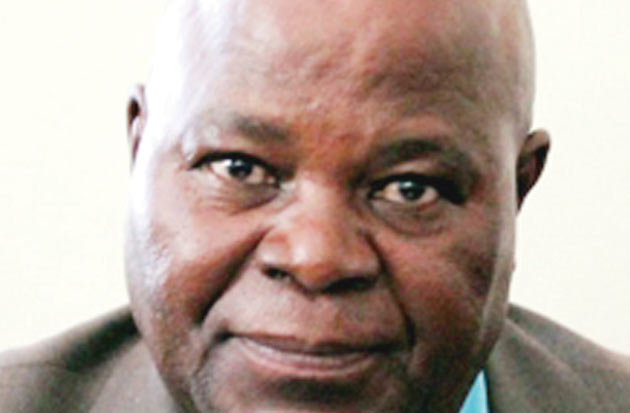‘Boko Haram journalists’ slammed

 Harare Bureau
Harare Bureau
Zimbabweans have roundly condemned the conduct of some fringe “journalists” from an unregulated on-line gutter website fronting as Sahara News who harangued and harassed President Robert Mugabe as he attended the inauguration of President Muhammadu Buhari in Abuja, Nigeria last Friday.
Media and political analysts expressed shock at the apparent lax in security accorded to President Mugabe by Nigerian authorities.
The harassment of the President has been described as a direct attack on the entire African continent as he was attending the inauguration in his official capacity as the African Union chairperson.
Commenting on his twitter account, Information, Media and Broadcasting Services Minister Professor Jonathan Moyo, described as “uncouth” the behaviour of the “journalists” adding that the harassment was pre-planned.
He said it was surprising that the “journalists”, whom he labelled “would be Nollywood actors and Boko Haram journalists” had been allowed near the President to ask puerile questions.
“They were making silly statements which proved that theirs was preplanned onslaught on a visiting Head of State,” he said.
“These are political activists masquerading as journalists who imagine their country as a model of democracy. That would not happen in Zimbabwe against any visiting head of State or Government, not even Barack Obama or David Cameron. The ‘journalists’ or whoever they are, were not asking questions, but were making fools of themselves and their country.”
Prof Moyo added: “If Nigeria journalism has come to this, then God help Nigeria since nobody has monopoly over such uncouth misconduct. It is a sad tale of a man biting a dog when journalists make the news they should be covering. Free countries have rules including diplomatic courtesy not the display of Boko Haram journalism. Of course those are human beings, but are they journalists or Boko Haram?
A background check on the identity of the Sahara News revealed that it dabbles in what it calls “citizen journalism” and activism aimed at denouncing “officially-sanctioned corruption and disregard of the democratic principles enshrined in the constitution.” Observers expressed shock at how such a “gutter” group of “journalists” could have access to the VVIP section including being just at an arm’s length from the President.
Responding to assertions that some members of the Zimbabwean security and protocol should be fired, Prof Moyo said: “The responsibility of protecting the President there squarely fell on the shoulders of Nigerian authorities. Our guys did a sterling job. That was a VVIP area and the question is who let those would be Nollywood actors there?” He said while the “journalists” had ambushed President Mugabe, they had actually humiliated themselves.
Acting Foreign Affairs Minister Ambassador Christopher Mutsvangwa said: “It’s an old trick. These are planted agents who’ve been organised by ambitious malcontents. It isn’t surprising that you might see a local hand in all this. It’s a domestic thing that has nothing to do with Nigeria. I see malice and mischief by people who foist their domestic disgruntlement onto hired foreign agents camouflaged as journalists.”
Zimbabwe Media Commission chairperson Tafataona Mahoso, said the conduct of the “journalists” not only exposed serious contempt and disrespect of President Mugabe, but also exposed the Nigerian complicit in the whole media stunt. “You must remember that it was in Nigeria that the DailyNews published a special addition when Olusegun Obasanjo (former Nigerian President) collaborated with John Howard (former Australian Prime Minister) in having Zimbabwe expelled from the Commonwealth. It was also Nigeria, which betrayed Charles Taylor (former Liberian President) when they collaborated with ICC to have him sent to The Hague. The same Nigeria is the one that also together with South Africa supported a UN resolution for the bombardment and invasion of Libya,” said Mahoso.
He said the new Nigerian administration has a lot to do in terms of projecting the real character of Nigeria not the one associated with deceit and collaboration with regime change charlatans.
University of Zimbabwe lecturer, Tavengwa Gwekwerere, trashed the nature of questions posed by the “journalists” whom he described as not only ignorant of the political situation in Zimbabwe, but also demonstrated their ideological bankruptcy.
“We don’t expect real journalists to be ignorant of the fact that Zimbabwe recently had elections that were resoundingly won by President Mugabe whose mandate runs to 2018. Their questions didn’t reflect the kind of research that we expect journalists to have undertaken before meeting such high profile figures. These are people clearly singing for their supper. Their conduct was outlandish and outrageous,” said Gwekwerere.
Zimbabwe Union of Journalists secretary-general Foster Dongozi, condemned the harassment saying President Mugabe had gone to Nigeria as the African Union chair and should have been accorded the dignity and respect that suited his office.
“There’s no way a visiting Head of State or Government can be allowed to be embarrassed by people pretending to be journalists,” he said. “As much as we respect freedom of expression, we’re disappointed by the behaviour of those gangsters in the presence of Nigerian authorities. As Africans, we should respect leaders particularly putting into context that President Mugabe was holding the revered office of AU chair. They should’ve known this was no ordinary person, but a leader of the whole continent, including themselves.”
Veteran journalist Innocent Chofamba Sithole said the “journalists” had squandered an engagement opportunity with President Mugabe in favour of heckling. “Their approach was unprofessional and unjournalistic,” he said. “After all, he’s there as head of the AU and any professional journalist would of course address him first and foremost with the respect and dignity of his office. To fail to do so is to disrespect our own institutions and therefore, ourselves.”











Comments